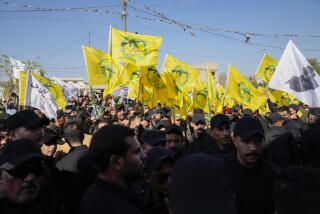Shadowy Saboteurs Seek to Undermine Khomeini : Siege of Car Bombings Gripping Iran’s Cities
A siege of car-bomb terror has gripped Iran’s cities, the work of shadowy saboteurs who plant explosives in busy plazas, outside mosques and near bazaars in an apparent campaign to undermine the Ayatollah Ruhollah Khomeini’s rule.
Two explosions during the last four days in the Iranian capital of Tehran and the Shia Muslim holy city of Qom have killed 33 people and wounded at least 100.
In Athens on Wednesday, a previously unknown Iranian group calling itself SYS claimed responsibility for the two car-bomb attacks.
An anonymous caller told the Associated Press that the group is “a nationalist organization that aims to make Iran as uncomfortable as possible for the regime of Ayatollah Khomeini.”
“The attacks were to urge people to mobilize against the regime,” said the caller, who spoke in English.
The explosions this week were the latest in a series of at least 16 bombings--mostly the explosions of dynamite-laden automobiles--that have killed at least 55 people and wounded more than 300 in the last 15 months.
Khomeini’s seven-year-old revolutionary government, speaking through the Islamic Republic News Agency, in most cases has laid the blame for the bombings in three directions: Iraq, which has been at war with Iran since 1980, “U.S. agents” or the leftist Iranian guerrilla group called the Moujahedeen.
American officials dismiss the allegations of U.S. involvement. The Moujahedeen, based for the past 2 1/2 months in Iraq, also rejects the charges and contends that agents of Khomeini’s own government are planting the bombs.
By attributing them to the anti-Khomeini underground, the bombings are designed to “blemish the image of the Iranian people’s just resistance,” the Muslim socialist group said in a statement issued Tuesday in Paris.
The Moujahedeen, which in the early 1980s claimed responsibility for devastating bomb attacks that killed revolutionary President Mohammed Ali Rajai and Prime Minister Mohammed Javad Bahonar, maintains that it does not engage in indiscriminate attacks that injure innocent civilians.
It has kept up its assaults on government targets, however. In a recent news bulletin, the group claimed to have killed or wounded 12 revolutionary guardsmen and other “agents of torture and execution” in clashes in four Iranian cities.
And the U.S. State Department, characterizing the Moujahedeen as “anti-American and anti-Western,” said last year that the group “continues to employ terrorism and violence as standard instruments of policy.”
After moving their headquarters from Paris to Baghdad in June, reportedly under French pressure, the Moujahedeen, led by Massoud Rajavi, said the shift closer to Iran’s border would enable its members to open a new phase in their struggle against Khomeini’s Muslim fundamentalist rule.
The car bombings have seldom been followed by claims of responsibility. But an anonymous caller to the Associated Press in Nicosia, Cyprus, in February claimed responsibility for a Tehran bombing in the name of an anti-Khomeini “Freedom Organization.”
At times, official Iranian sources also have blamed bombings on anti-Khomeini militants led by Shahpour Bakhtiar, the last prime minister to serve Shah Mohammed Reza Pahlavi before the monarch’s ouster in 1979.
More to Read
Sign up for Essential California
The most important California stories and recommendations in your inbox every morning.
You may occasionally receive promotional content from the Los Angeles Times.










